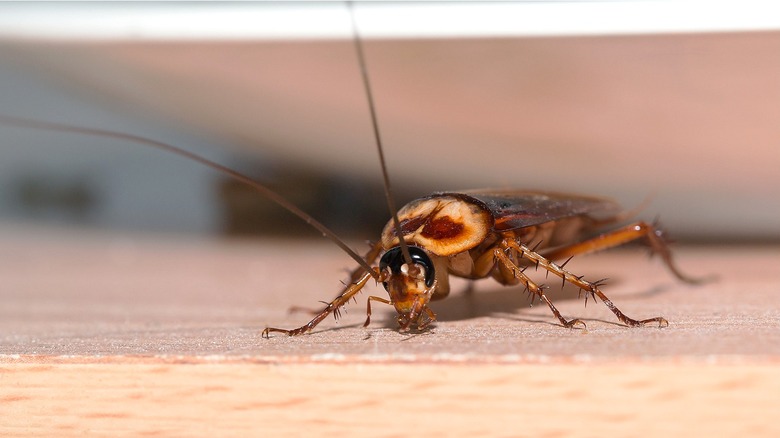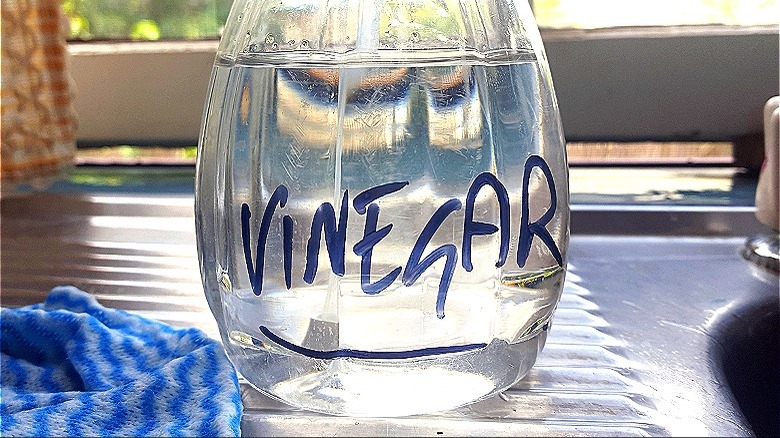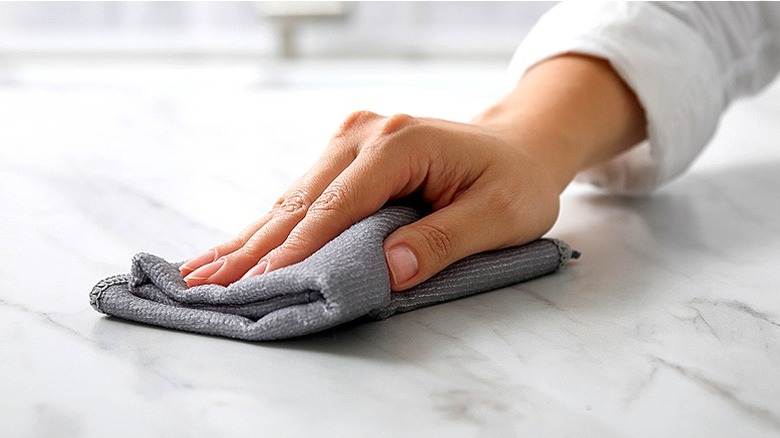Think Twice Before Using This Household Product To Get Rid Of Cockroaches
When you find cockroaches in your home, you're faced with two options. You can either use pesticides, whether you call an exterminator or purchase them yourself, or you can try to find a natural solution to your pest problems. Many opt to use natural means, like kitchen ingredients or pantry staples, since they want to avoid pesticides in their home due to kids, pets, or their health. However, vinegar, while a versatile cleaning tool, is one common household product that may not be the best choice for ridding your home of roaches.
There's the old joke that cockroaches will outlive people, and there are reasons for that. Roaches are highly adaptable and evolve over the course of a few generations so things that attracted them in the past don't anymore, like the sugary taste that was mixed with pesticides in the 1980s (which lost its efficacy in about 10 years, via New Scientist). On top of that, female roaches can reproduce without a male.
Then there are the scary roach characteristics that seemingly come from a horror movie yet they're all too real. An example? Roaches can exist even after their heads are cut off. They can also hold their breath for five to seven minutes. Then there's also the little scientific fact that roaches can survive a nuclear exposure to radiation between six to 15 times of what humans can.
Vinegar won't kill roaches but can help repel them
If you're looking to eliminate cockroaches in your home, white vinegar won't do it. As one of the most indestructible pests, roaches may scatter if you spray them with white vinegar but they won't be harmed. Apple cider vinegar has an acidic level of 4% to 6% while white vinegar has one between 5% to 7%. While white vinegar is slightly more acidic, it typically won't kill roaches either.
What vinegar can do, though, is help repel roaches in the home. Roaches seek what other pests do in homes; i.e., food, water, and shelter. They aren't picky eaters either and will congregate in the kitchen because that's where the food is. Cockroaches will eat all types of food, including meat, plants, carbs, and sweets. They'll also happily chomp away on non-food items like cardboard boxes, strands of hair, fingernails, soap, and glue. They will even eat each others' corpses.
Roaches are attracted to the scents of food and by spraying vinegar around the home, you can mask food smells. The smell of vinegar can also mask the scent of other roaches on the premises. This may make stray roaches more likely to keep moving along. Further, roaches communicate using their sense of smell so vinegar can block that ability.
Vinegar can help keep your home clean
One thing that vinegar can do is help keep your home clean, which can help prevent a roach problem. Keeping your kitchen spick and span and safeguarding against roaches having access to food is one of the best deterrents you can try. Start by keeping all food in airtight containers. Clean up messes as soon as they happen and sweep up crumbs right after they're dropped.
Then mix vinegar and water together in a spray bottle using a quarter cup of vinegar with 2 ½ cups of water. You can also add a drop of dish soap or just use the solution by itself to clean countertops, sinks, and appliances. To clean floors, add a half cup of white vinegar to 1 gallon of warm water and mop away.
Keep in mind that since roaches will eat other things besides food, although cleaning with white vinegar may deter them from setting up camp in your home, they will also infest homes for other reasons besides food. Like other pests, they'll seek shelter from the cold and the rain in homes, often finding their way in through cracks and crevices and hiding out in clutter.


